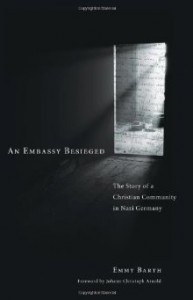ACCH Quarterly Vol. 16, No. 4, December 2010
Review of Emmy Barth, An Embassy Besieged: The Story of a Christian Community in Nazi Germany (Eugene, Oregon: Cascade Books, Plough Publishing, 2010), 306 pp. ISBN 13: 978-1-60899-879-1.
By John S. Conway, University of British Columbia
The Bruderhof was the name given to a small Christian experimental community established in 1919 by Eberhard Arnold, a charismatic teacher and preacher, as a protest against the militarism and nationalism which had led to Germany’s recent defeat. He sought to recreate a community based on the ideas of the radical Reformer, Jakob Hutter, whose disciples had long since been banished from Europe and survived only in small groups in the Dakotas and western Canada. They aimed to follow Tolstoy’s lead in living a communal life without individual property, but witnessing in unity to their common piety and pacifism. In the 1920s this group settled on a dilapidated farm in a remote corner of Hessen near Fulda and began to propagate their idealistic vision as best they could. At first, this alternative life-style attracted a number of young people both from Germany and from other parts of Europe, drawn together in fervent discipleship of brotherly love according to the Sermon on the Mount. By 1933, the community had grown to over 100 persons.
 The advent of the Nazi Party to power drastically altered the Bruderhof’s fortunes. Eberhard Arnold was quite clear about the incompatibility of his vision with Nazi ideology. It was not long before the local authorities began to harass the community, making use of allegations that they were a bunch of crypto-communists or even drug users. Already in November 1933, the farm was raided by armed policemen who openly declared that the Bruderhof had no place in Hitler’s Germany. The Bruderhof’s charitable status was revoked, their fostering of children at risk was suspended, and various sanctions damaged the profitability of their farming operations. In early 1934, they were forbidden to operate a separate Christian school, so that the school-age children had to be evacuated to Switzerland. In the following year, the introduction of military conscription led to the emigration of all their young men, whose pacifist beliefs prevented them from joining any military force. At first, a refuge was found on a remote hillside farm in Lichtenstein, until the authorities there bowed to Nazi pressure. Another section of the community then went to England in 1936, where they were befriended by Quakers and relocated to a farm in the Cotswolds. Unfortunately Eberhard Arnold died of a botched operation in November 1935, but even without his inspiring leadership the group managed to maintain their spiritual integrity. However, this was not enough to alter the Nazis’ resolute determination to get rid of them all. In April 1937, the police again raided the Bruderhof in force, declared its property to be confiscated, and ordered the community’s immediate disbandment. Three of the leaders were imprisoned for nearly three months, but were eventually released. The survivors emigrated from Germany to England and began to reorganize their witness once again.
The advent of the Nazi Party to power drastically altered the Bruderhof’s fortunes. Eberhard Arnold was quite clear about the incompatibility of his vision with Nazi ideology. It was not long before the local authorities began to harass the community, making use of allegations that they were a bunch of crypto-communists or even drug users. Already in November 1933, the farm was raided by armed policemen who openly declared that the Bruderhof had no place in Hitler’s Germany. The Bruderhof’s charitable status was revoked, their fostering of children at risk was suspended, and various sanctions damaged the profitability of their farming operations. In early 1934, they were forbidden to operate a separate Christian school, so that the school-age children had to be evacuated to Switzerland. In the following year, the introduction of military conscription led to the emigration of all their young men, whose pacifist beliefs prevented them from joining any military force. At first, a refuge was found on a remote hillside farm in Lichtenstein, until the authorities there bowed to Nazi pressure. Another section of the community then went to England in 1936, where they were befriended by Quakers and relocated to a farm in the Cotswolds. Unfortunately Eberhard Arnold died of a botched operation in November 1935, but even without his inspiring leadership the group managed to maintain their spiritual integrity. However, this was not enough to alter the Nazis’ resolute determination to get rid of them all. In April 1937, the police again raided the Bruderhof in force, declared its property to be confiscated, and ordered the community’s immediate disbandment. Three of the leaders were imprisoned for nearly three months, but were eventually released. The survivors emigrated from Germany to England and began to reorganize their witness once again.
This whole sad story is excellently told by Emmy Barth, one of Eberhard Arnold’s descendants, who is the community’s archivist in what is now their main centre in upper New York State. She has skillfully woven together and translated the surviving material of Arnold’s sermons, speeches and letters, and has been able to discover in Berlin the relevant documents in the records of the Reich Ministry of Church Affairs for 1936-37. While this book is entirely written from the point of view of those affected and tells us little that is new about the Nazi persecution of these minor sects, nevertheless her story is a valuable illustration of self-reliant spiritual strength refusing to capitulate in the face of ruthless and unfeeling paranoia.. Thanks to Eberhard Arnold’s prophetic vision, the Bruderhof movement continues to survive and indeed flourish. Emmy Barth’s sequel to this book, No Lasting Home: A Year in the Paraguayan Wilderness, continuing the story of their subsequent wartime flight from England to Paraguay, was reviewed in our March 2010 issue (Vol. 16, No. 1).
